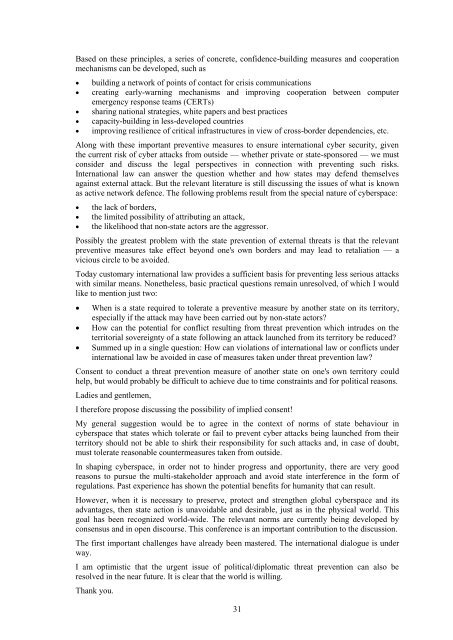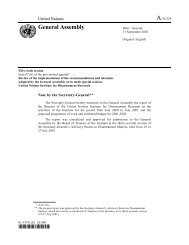Challenges in Cybersecurity Risks, Strategies, and ... - Unidir
Challenges in Cybersecurity Risks, Strategies, and ... - Unidir
Challenges in Cybersecurity Risks, Strategies, and ... - Unidir
Create successful ePaper yourself
Turn your PDF publications into a flip-book with our unique Google optimized e-Paper software.
Based on these pr<strong>in</strong>ciples, a series of concrete, confidence-build<strong>in</strong>g measures <strong>and</strong> cooperation<br />
mechanisms can be developed, such as<br />
� build<strong>in</strong>g a network of po<strong>in</strong>ts of contact for crisis communications<br />
� creat<strong>in</strong>g early-warn<strong>in</strong>g mechanisms <strong>and</strong> improv<strong>in</strong>g cooperation between computer<br />
emergency response teams (CERTs)<br />
� shar<strong>in</strong>g national strategies, white papers <strong>and</strong> best practices<br />
� capacity-build<strong>in</strong>g <strong>in</strong> less-developed countries<br />
� improv<strong>in</strong>g resilience of critical <strong>in</strong>frastructures <strong>in</strong> view of cross-border dependencies, etc.<br />
Along with these important preventive measures to ensure <strong>in</strong>ternational cyber security, given<br />
the current risk of cyber attacks from outside — whether private or state-sponsored — we must<br />
consider <strong>and</strong> discuss the legal perspectives <strong>in</strong> connection with prevent<strong>in</strong>g such risks.<br />
International law can answer the question whether <strong>and</strong> how states may defend themselves<br />
aga<strong>in</strong>st external attack. But the relevant literature is still discuss<strong>in</strong>g the issues of what is known<br />
as active network defence. The follow<strong>in</strong>g problems result from the special nature of cyberspace:<br />
� the lack of borders,<br />
� the limited possibility of attribut<strong>in</strong>g an attack,<br />
� the likelihood that non-state actors are the aggressor.<br />
Possibly the greatest problem with the state prevention of external threats is that the relevant<br />
preventive measures take effect beyond one's own borders <strong>and</strong> may lead to retaliation — a<br />
vicious circle to be avoided.<br />
Today customary <strong>in</strong>ternational law provides a sufficient basis for prevent<strong>in</strong>g less serious attacks<br />
with similar means. Nonetheless, basic practical questions rema<strong>in</strong> unresolved, of which I would<br />
like to mention just two:<br />
� When is a state required to tolerate a preventive measure by another state on its territory,<br />
especially if the attack may have been carried out by non-state actors?<br />
� How can the potential for conflict result<strong>in</strong>g from threat prevention which <strong>in</strong>trudes on the<br />
territorial sovereignty of a state follow<strong>in</strong>g an attack launched from its territory be reduced?<br />
� Summed up <strong>in</strong> a s<strong>in</strong>gle question: How can violations of <strong>in</strong>ternational law or conflicts under<br />
<strong>in</strong>ternational law be avoided <strong>in</strong> case of measures taken under threat prevention law?<br />
Consent to conduct a threat prevention measure of another state on one's own territory could<br />
help, but would probably be difficult to achieve due to time constra<strong>in</strong>ts <strong>and</strong> for political reasons.<br />
Ladies <strong>and</strong> gentlemen,<br />
I therefore propose discuss<strong>in</strong>g the possibility of implied consent!<br />
My general suggestion would be to agree <strong>in</strong> the context of norms of state behaviour <strong>in</strong><br />
cyberspace that states which tolerate or fail to prevent cyber attacks be<strong>in</strong>g launched from their<br />
territory should not be able to shirk their responsibility for such attacks <strong>and</strong>, <strong>in</strong> case of doubt,<br />
must tolerate reasonable countermeasures taken from outside.<br />
In shap<strong>in</strong>g cyberspace, <strong>in</strong> order not to h<strong>in</strong>der progress <strong>and</strong> opportunity, there are very good<br />
reasons to pursue the multi-stakeholder approach <strong>and</strong> avoid state <strong>in</strong>terference <strong>in</strong> the form of<br />
regulations. Past experience has shown the potential benefits for humanity that can result.<br />
However, when it is necessary to preserve, protect <strong>and</strong> strengthen global cyberspace <strong>and</strong> its<br />
advantages, then state action is unavoidable <strong>and</strong> desirable, just as <strong>in</strong> the physical world. This<br />
goal has been recognized world-wide. The relevant norms are currently be<strong>in</strong>g developed by<br />
consensus <strong>and</strong> <strong>in</strong> open discourse. This conference is an important contribution to the discussion.<br />
The first important challenges have already been mastered. The <strong>in</strong>ternational dialogue is under<br />
way.<br />
I am optimistic that the urgent issue of political/diplomatic threat prevention can also be<br />
resolved <strong>in</strong> the near future. It is clear that the world is will<strong>in</strong>g.<br />
Thank you.<br />
31








